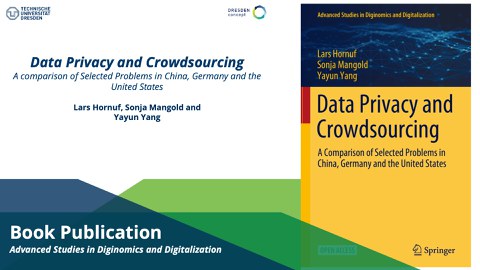Aug 04, 2023
New Book Publication
Professor Dr. Lars Hornuf has published a new book under the title Data Privacy and Crowdsourcing: A Comparison of Selected Problems in China, Germany, and the United States. The book was written in collaboration with Dr. Sonja Mangold and Dr. Yayun Yang.
Data has been dubbed the new oil driving the business models of the digital economy, but there are considerable privacy risks for those operating in the digital space. People whose livelihoods depend on crowdworking can be particularly affected since the use of their data can be essential for them.
The objectives of this book are threefold. First, the authors provide a concise overview of the crowdsourcing markets in China, Germany, and the United States and highlight recent market trends. Second, the authors examine the data protection laws in these three jurisdictions and show the extent to which crowdworkers and other platform users such as website visitors, clients are protected. Third, the authors analyze and compare data privacy practices on crowdsourcing platforms and highlight how they relate to legal rules.
In sum, the authors find that as of now, there are no specific regulations for protecting data on crowdsourcing platforms in China, Germany, or the United States. However, in all three countries, there has been an increase in the number of laws and regulations being developed to address the handling of data on these platforms in recent years. In studying how crowdsourcing platforms handle data protection and analyzing information from 416 privacy statements, the authors find that German platforms tend to rely mostly on the GDPR for their data processing, while U.S. platforms refer to a variety of international, European, and state-level legal sources on data protection. Chinese crowdsourcing platforms, which are often not accessible to foreign users, do not generally reference the GDPR in their privacy statements. Some U.S. platforms were particularly clear about which data they do not process, as indicated in their privacy statements. This approach could also become best practice for German platforms in the future. When the authors compare the privacy practices of crowdsourcing platforms with those of the German financial technology sector, they observe that pseudonymization and anonymization are used much more frequently on crowdsourcing platforms in Germany. Most privacy statements did not provide a thorough explanation of which personal data are shared with third parties, despite mentioning that data is shared with such parties. These findings have important implications for the crowdsourcing industry, and the policymakers and scholars concerned with data privacy and crowdsourcing.

